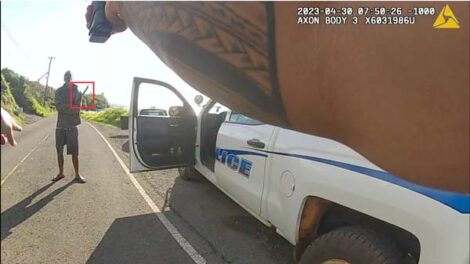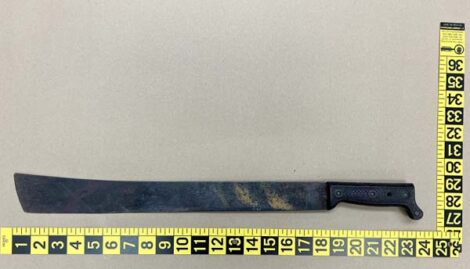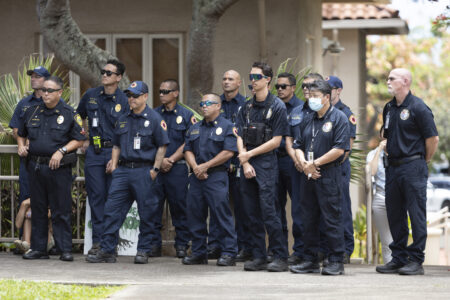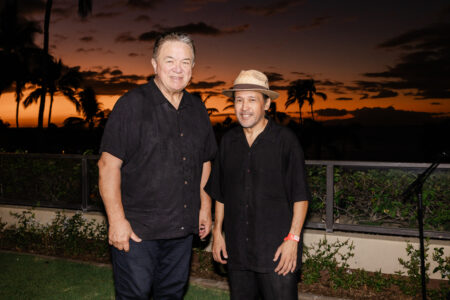Police release footage in fatal shooting on Molokai
Body cam shows officers telling man to drop machete multiple times in tense exchange
WAILUKU — Maui Police Department officers told Nathaniel Naki to drop his machete more than 70 times before they fatally shot him Sunday after an earlier Taser deployment failed to subdue him, police said at a news conference Wednesday afternoon.
MPD released a portion of a Molokai officer’s body camera footage in the fatal incident, in which the 40-year-old Kaunakakai man was killed while police were responding to a report of a temporary restraining order violation near mile marker 18.5 on Kamehameha V Highway in Wailua at 7:41 a.m. Sunday.
“Put it down now,” an officer can be heard telling Naki, who was on the roadway after leaving his vehicle on the side of the road. “Nathaniel, I don’t want to kill you today. Put it down.”
Police can be heard repeatedly telling and pleading with Naki “to put it down.” At one point, Naki is heard saying police were “wrong,” with an officer responding that Naki was wrong in going to a place he was not supposed to.
The verbal exchange between Naki and the officers, which contained profanity, lasted around three minutes, with Naki telling officers to shoot and also saying that he was “not swinging” his machete.
Police also told him about 29 times to move back, which he did multiple times before coming back toward the officers. Twice in the footage, he turns and walks away from officers, one of whom walks after him and calls out, “Where you going, brah? Put it down.”
At one point Naki says, “Drop your guns right now.”
“No, you drop your machete,” the officer says. “We in charge.”
Police at the news conference at the Wailuku Police Station stopped the body camera footage prior to Naki being shot.
Assistant Chief of Uniformed Services Keola Tom said that what happens afterwards is that “Mr. Naki eventually advances toward one of the officers and gets within two arms’ length before both officers almost simultaneously discharge their weapons.”
Tom said that later footage — which was not shown to reporters — shows the officers on scene calling for paramedics and offering aid by using their medical kits. Tom added that an off-duty firefighter was allowed to render aid in footage that also was not shown to reporters.
Earlier this week, police said Naki was taken to Molokai General Hospital for further treatment where he later succumbed to his injuries. Officers involved have been placed on administrative leave as standard procedure.
Police did not allow any questions from the media during the news conference.
Tom said officers initially made contact with a family member who called police about the TRO violation, as Naki was on private property acting disorderly. The call came in at 7:17 a.m. But when police arrived, the family member said Naki had left. Naki was prohibited from being on the property due to a TRO.
Officers then located Naki nearby and “Mr. Naki automatically advances while carrying a 2-foot machete.”
Tom said an officer discharged his Taser “but there is no effect.”
After the footage was shown to the press, Police Chief John Pelletier said that one of the officers involved had undergone critical incident training and the other officer had attempted to get Naki “critical services on prior occasions.”
“Life-saving measures were administered. We understand that we have a family who is grieving the loss of a loved one. There are no winners in critical incidents and we all pay a price,” he said. “Our officers did not wake up that morning with the intent to harm anyone. Those officers by choice are members of the Molokai community.”
“Their lives are forever affected as well. For them, their families, and their children to be threatened or intimidated is wrong. It is the suspect’s action that dictate an officer’s response.”
Pelletier said that “being an officer is not easy, you make split-second decisions” in “dynamic situations.”
He said that more often, officers are seeing people who suffer from mental health and substance abuse issues.
“The safety of the community is our top priority and this incident illustrates all too well the dangers and realities that members of law enforcement face every single day,” Pelletier said.
Police said that if Naki had been arrested instead, he would have been charged with first-degree attempted murder, disorderly conduct, harassment and violation of an order for protection.
Members of the Naki family could not be reached for comment on Wednesday.
But some family members have spoken up on social media, saying Naki would not hurt anyone. His sister told Hawaii News Now that he was bipolar and “had his good days and bad days,” and that the TRO was in place for when his mental illness was too much for their mother to handle.
According to court records, both his mother and father filed temporary restraining orders against Naki this year, saying they were afraid of his actions.
His mother, Julieann Naki, said in an ex-parte petition for a temporary restraining order that on Jan. 17, her son got upset as her grandson had changed the music, so he elbowed the grandson in the head and face, and the child fell.
Julieann Naki said she pushed her son away to stop him. He yelled at her, so she called the police.
“I’m afraid because Nathaniel isn’t in the right state of mind and he may come after next,” she wrote in the petition.
Nathaniel Naki’s father, Raymond Naki, also filed for a temporary restraining order on April 14, saying his seven dogs needed protection.
He referred to verbal abuse by Nathaniel Naki and said he exhibited “continuous yelling and screaming obscenities to myself and people visiting my property.”
“People have been terrified by his actions,” Raymond Naki wrote. “I need the help to enforce his medication and seek assistance to hospitalize.”
The elder Naki said his son hurts the animals and has been threatening and has caused destruction of property.
Dr. Dara Rampersad, who around a decade ago helped launch MPD’s and the state’s first Crisis Intervention Team program aimed at improving first responder services to people living with mental illness, said more and more first responders in Hawaii and the nation are encountering people with mental illness, and that the COVID-19 pandemic has also impacted people’s mental health with lasting effects.
While on Maui, Rampersad, a first responder and forensic psychologist, said there were other instances in which people were wielding weapons such as machetes and were not shot.
“The officers generally do a great job in trying to identify how they can connect with that person, because no officer that I know — and I know a lot of officers, I work with many, many departments — no officer that I know wants to shoot someone,” said Rampersad, who now practices in Arizona and has more than 25 years of experience in the mental health field. “They don’t want to end up in a position where they live with that guilt, that feeling of what could I have done differently.”
Rampersad, who spoke Wednesday morning prior to release of the footage, said that in situations in which people with mental health concerns are involved, officers may initially deal with the situation nonverbally, as those who have gone through the CIT program may wear a badge, which is a signal that the officer is highly trained in that area. The officer may then make a calm approach to the defendant in a nonthreatening position.
But, “all this stuff changes when there is a weapon on scene.”
Rampersad said that when officers are called to a scene, they have to keep people safe — “they can’t walk away when they see a weapon involved.”
In the wake of the shooting, he called for compassion for everyone involved.
“It makes it very tough. The community is hurting, that’s the thing to focus on right now, everyone in the community including the police department is hurting right now,” Rampersad said. “That happens across every community that deadly force is used and is not wished upon anybody including the officers.”
* Staff Writer Melissa Tanji and be reached at mtanji@mauinews.com.
- Maui Police Chief John Pelletier (from left), Assistant Chief Keola Tom, Deputy Chief Wade Maeda and Molokai Patrol Commander Jamie Winfrey appear at the Wailuku Police Station during a news conference Wednesday to discuss an officer-involved fatal shooting of 40-year-old Nathaniel Naki on Molokai Sunday. The Maui News / MELISSA TANJI photo
- A screenshot from an officer’s body cam footage shows the officer pointing a gun at 40-year-old Nathaniel Naki while responding to a call about a temporary restraining order violation early Sunday morning. Police say Naki was holding a machete (outlined in the red box) and was told to “put it down.” Photos courtesy MPD
- A machete that police say Nathaniel Naki was wielding when he was confronted by officers early Sunday morning is shown. Photo credit







